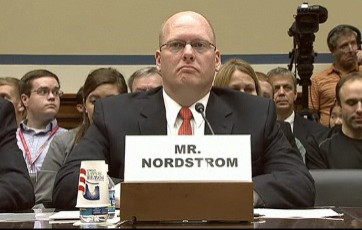After Benghazi, A 'New Security Reality' For US Diplomats

The attack on the U.S. Consulate in Benghazi, Libya, last month was so overwhelming that security officials say they couldn’t have countered it with additional manpower. And they fear it signals a new security reality.
Eric Nordstrom, a former regional security officer for U.S. diplomats in Libya, told Congress during a hearing Wednesday about the perceived security lapses before and during the Sept. 11 Benghazi assault that the State Department acted professionally.
Yet, “the ferocity and intensity of the attack was nothing that we had seen in Libya, or that I had seen in my time in the Diplomatic Security Service,” Nordstrom said. Four Americans were killed, including U.S. Ambassador to Libya Chris Stevens.
In a written statement to the House committee, Nordstrom said higher walls and extra guards or agents wouldn’t have enabled the security team to respond to the kind of assault it faced.
“I’m concerned that this attack will signal a new security reality, just as the 1984 Beirut attack did for the Marines; the 1998 East Africa bombings did for the State Department; and 9/11 for the whole country,” he said.
Risk mitigation, said Nordstrom, who served in Libya from September 2011 to July of this year, must be balanced with the needs of diplomats to do their job in dangerous territories. “The answer cannot be to operate from a bunker,” he said.
The hearing, conducted by the Committee on Oversight and Government Reform, was Congress' first investigation into the attacks that killed Stevens and three other Americans – Sean Smith, Glen Doherty and Tyrone Woods – last month.
Committee Chairman Darrell Issa, R-Calif., said the hearing sought to understand what went wrong that day, how to prevent a repeat, and quickly put in place changes.
“Protecting our diplomats has long been a bipartisan issue,” Issa said in his opening statement. “Majorities of both Democrats and Republicans in the House voted to approve the bill that set the funding level for the State Department.”
Rep. Jason Chaffetz, R-Utah, chairman of the subcommittee on national security issues, said investigating the four Americans’ death isn’t politics but a moral duty.
“This is a very serious situation,” he said. “We have to understand how we got there.”
Another witness was Lt. Col. Andrew Wood of the Utah National Guard, who was temporarily deployed to Libya and commanded a 16-member site security team. He left a month before last month’s assault, when the State Department didn’t extend the team’s duty beyond August.
“The security in Benghazi was a struggle and remained a struggle throughout my time there,” he said. “The situation remained uncertain and reports from some Libyans indicated it was getting worse. Diplomatic security remained weak. In April there was only one U.S. diplomatic security agent stationed there.”
There was also a struggle for regional security officers to get additional personnel and bump up security to a comfortable level, he added.
The State Department has said terrorists, possibly affiliated with al Qaeda, were involved in the attack. President Barack Obama has said that the type of weaponry used indicate that the consulate assault was more than an out-of-control protest against an anti-Islam film, as it had initially appeared to be.
© Copyright IBTimes 2024. All rights reserved.






















